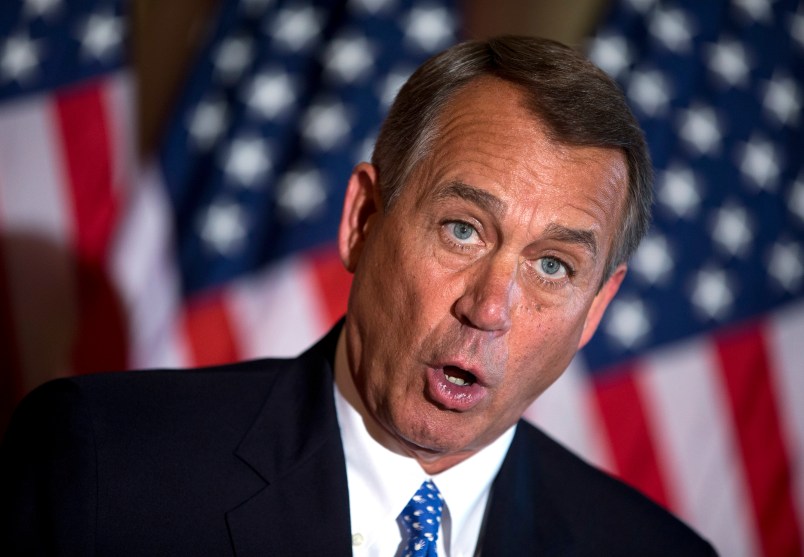One of the next big tests for Obamacare’s long-term viability — matched only perhaps by whether people actually like their new coverage — is what happens to health insurance premiums in 2015.
House Republicans were digging for bad premium news last week, though insurance executives declined to give it to them, and prominent GOPers have sounded the warning bells whenever a headline suggesting skyrocketing prices gets published.
“Americans will be shocked by higher premiums this November,” teased the Republican National Committee in late April. House Speaker John Boehner’s office tweeted a similar headline the month before. It looks like to be their next big attack on the law.
But they left out one crucial piece of information: Obamacare is designed to protect enrollees against year-to-year price fluctuations. Warning about higher premiums leaves an impression that people will pay more, and the GOP surely won’t hesitate to push that line again whenever news of rising premiums breaks.
But they’re not telling the whole story.
Larry Levitt, vice president at the non-partisan, non-profit Kaiser Family Foundation, noted this key point in some tweeted perspective on the premium news that has emerged in the last few days. The Wall Street Journal reported Tuesday that at least one insurer in Washington was cutting rates next year. A day earlier, the newspaper reported on filings in Virginia that showed premium increases — but not as big of a bump as some had warned.
But inseparable from any news about premiums is an understanding of how Obamacare actually works: People receiving subsidies are “shielded” from price increases, Levitt told TPM in an email.
It’s complicated, like most things related to the law. The tax subsidies are calculated based on a person’s income — ranging from 2 percent to 9.5 percent in 2014. They cap the dollar amount that a person would pay for a benchmark plan (the second cheapest “silver-level” plan, which covers 70 percent of medical costs on average). If somebody buys a more expensive policy, then they are liable for the extra cost; if they buy a cheaper one, then they keep the savings.
But because the price those people are responsible for paying is tied to their incomes, not their premiums, they are mostly protected from any price increases that Republicans are warning about.
“That means people receiving premium subsidies in the exchanges… will be largely shielded from premium increases because they will pay related to their income, while the government will make up the difference,” Levitt explained.
Remember: About 85 percent of Obamacare’s 8 million enrollees received financial assistance and 85 percent of them signed up for either a silver-level plan or an even cheaper policy. That suggests the vast majority of them should be mostly unaffected no matter what happens to premiums.
There are some caveats. First and foremost, some people aren’t eligible for subsidies and those people will feel the brunt of any increases. They are a small minority of those enrolling through HealthCare.gov and its state counterparts, but some people are signing up directly through insurers as well.
Second, premium increases could change what the benchmark plan is for subsidies. If that changes, people might end up having to pay more to keep the exact same plan that they currently have. But that remains to be seen. It’s also worth remembering that the initial premiums being filed this spring are not final, but the first step in a multi-step process.
Third, the federal government will be liable to pay more money toward the subsidies if premiums go up, even if the average American isn’t. But because premiums were cheaper than expected in 2014, the law is already starting out better than originally projected, Levitt noted.
Even with those considerations, the GOP is leaving out a big piece of the story when it warns that Americans “will be shocked” by 2015 premiums. That’s only if they don’t have all the facts.







Way, way too complicated for the average republican, and it won’t stop the liars from screaming about rate increases. Like rate increases haven’t been happening every year for at least 2 - 3 decades. They are already doing it on all the FOX channels. The bad thing will be the lazy press who just act like publicists and never challenge what the repugs say.
Tell me which year in the past fifty saw actual reductions in health insurance premiums. Premiums reflect the cost of care. Costs rise with general inflation at a minimum. Premums rise as well. What mendacious Republicans hope is that the Americanpeople are stupid enough to buy into this bs.
This alone is good reason to get them out of control of government and put a fact-based Congress in place.
Put a fork in the GOP. It’s OVER!
What were the average premium rate increases prior to the passage of the ACA?
If we look that up and compare and contrast with the anti-ACA dead-enders bloviating nonsense, it won’t look pretty for them.
If you’re of a mind to believe what the GOP says, you’ll believe it, if you aren’t, you won’t.